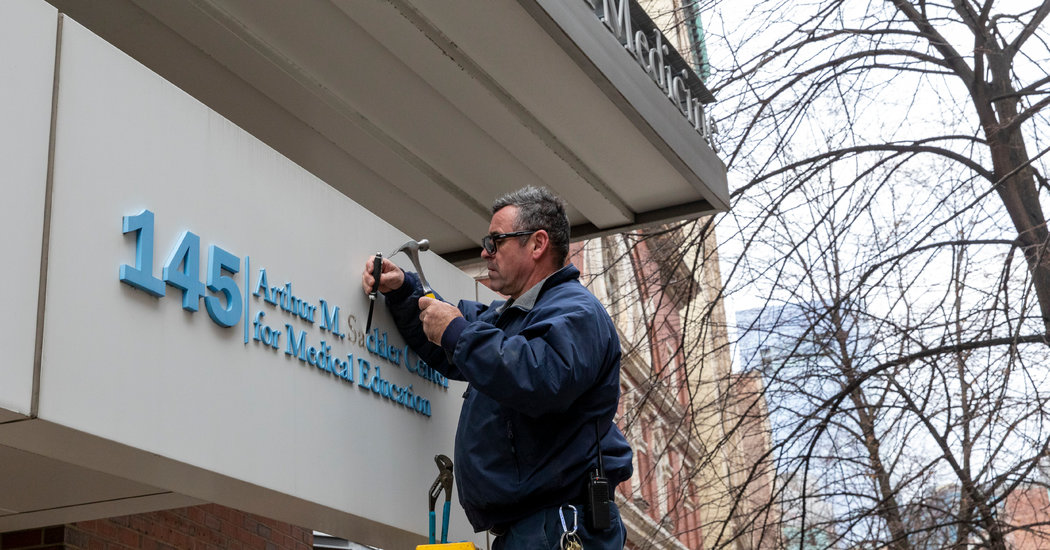
CAMBRIDGE, Mass. — Two weeks after Tufts University became the first major university to remove the Sackler name from buildings and programs over the family’s role in the opioid epidemic, members of the family are pushing back. A lawyer for some of the Sacklers argued in a letter to the president of Tufts that the move was unjustified and a violation of agreements made when the school wanted the family’s financial help years ago.
The letter described Tufts’s decision to remove the name as “contrary to basic notions of fairness” and “a breach of the many binding commitments made by the University dating back to 1980 in order to secure the family’s support, including millions of dollars in donations for facilities and critical medical research.”
Institutions that have accepted financial support from the Sacklers have in recent months faced growing cries to distance themselves from the family.
The forceful response by Sackler family members now may be seen as a signal to other institutions amid a flurry of announcements by major cultural organizations that they would no longer take donations from the family. The response also raised complicated legal questions about what room institutions have to unilaterally remove a donor’s name long after a gift has been accepted.
The lawyer, Robert Cordy, who represents the descendants of two of the brothers who built Purdue Pharma, Raymond and Mortimer Sackler, wrote that Tufts chose “to prioritize optics over a fair process.”
A spokesman for Tufts, Michael Rodman, said in a statement: “We considered a number of factors in making the decision to remove the Sackler name and ultimately decided that the association with Tufts University was untenable and in opposition with the values and mission of the medical school and the university. Since the announcement we have received incredible support from faculty, students, alumni and the public. We at Tufts stand by our decision, we know that it is the right thing to do, and we are prepared to vigorously defend our position.”
The rising toll of the opioid crisis has drawn more attention to the role of Purdue in aggressively marketing OxyContin, its blockbuster painkiller, and built public pressure on institutions to stop taking Sackler money and remove the family’s name from their walls.
The pushback against Tufts comes as questions are being raised about how much the Sacklers should pay to resolve thousands of lawsuits brought by state and local governments seeking to hold Purdue accountable for the crisis. The family has agreed to contribute $3 billion and relinquish control of Purdue as part of a settlement, but 24 states have refused to sign the agreement, arguing that the Sacklers should pay more.
But decisions by major institutions to remove the Sackler name from existing facilities have been rare. This year, the Louvre in Paris removed the name from a wing that had been known since 1997 as the Sackler Wing of Oriental Antiquities. In that case, however, the Louvre said that its naming agreements lasted only 20 years.
There were three Sackler brothers, all of whom made gifts to Tufts, and different branches of the family have responded differently to Tufts’s decision.
One of the brothers, Arthur, is widely credited with shaping modern medical advertising, but he died before OxyContin was introduced and his brothers then bought his stake in the company. His widow, Jillian Sackler, released a statement emphasizing that her husband had no involvement with OxyContin, saying, “It deeply saddens me to witness Arthur being blamed for actions taken by his brothers and other OxySacklers.”
Michael Ward Stout, a lawyer who has worked with museums, said that an institution’s right to withdraw from a naming agreement depended on the terms of the contract. He said that when Lincoln Center in New York wanted to change the name of Avery Fisher Hall, the home of the New York Philharmonic, to attract a major gift for its renovation, officials paid the Fisher family $15 million for permission to drop the name. (Mr. Fisher’s original gift to support the hall, in 1973, had been $10 million.)
In some cases, like that one, “You can buy yourself out of it,” he said.
In 2018, the Massachusetts attorney general filed a civil complaint against eight members of the Sackler family, along with Purdue and numerous Purdue executives and directors, saying that the company had misled doctors and patients about the risks of OxyContin.
In a court filing this past January, the attorney general asserted that the Sacklers and Purdue had used their relationship with Tufts to promote use of OxyContin by gaining access to local doctors and trying to influence research about pain treatment.
In response to the filing, Tufts commissioned Donald K. Stern, a former United States attorney, to undertake an independent review of the university’s relationship to the Sacklers and Purdue.
The review, which was released on the same day that Tufts said it would jettison the Sackler name, found that in most cases money from the Sacklers and Purdue went to programs unrelated to pain treatment and opioids; in other cases, it said, there was no evidence the donations materially skewed academic programs.
But the review did find that Purdue had intended to use the relationship with Tufts to advance its interests and that in some instances it was successful in exerting influence.
“Moreover, we conclude that there was an appearance of too close a relationship between Purdue, the Sacklers, and Tufts,” the report said.
In his letter, Mr. Cordy hinted at the possibility of legal action, asking the president of Tufts, Anthony Monaco, to preserve documents relating to the Sackler family and the deliberations over removing its name.
Ellen Barry contributed reporting.

